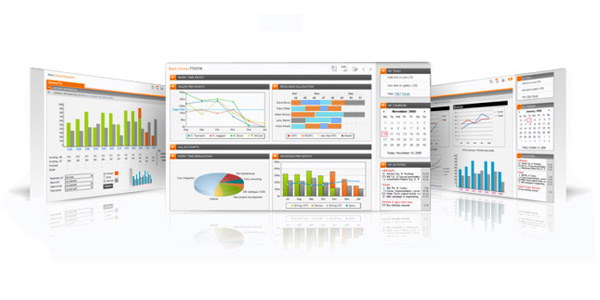Under the circumstances of the oft-recurring crises and system breakdowns, fierce competitiveness and emboldened clients, changing business models and global financial assets tripling by 2020 (at least, according to some estimation), CIOs see cost reduction as well as the change of the status quo as critical business priorities for the future. New challenges demand new approaches. Cloud computing, the buzzword that can be a Messiah for financial services industry. « Move to the cloud and never wait for the server » this phrase could really be the motto for financial firms. To put it more exactly, today we will look into this odd expression and throw the light on the following: how cloud computing can be applicable to financial services, which services can be moved to a cloud and how cloud computing is actually used by the leading financial services companies.
In general, the US National Institute of Standards and Technology defines cloud computing as a model for enabling ubiquitous, convenient, on-demand network access to a shared pool of configurable computing resources (e.g., networks, servers, storage, applications, and services) that can be rapidly provisioned and released with minimal management effort or service provider interaction (Actually, a cloud means a virtual « pool » for data that is quickly accessible and mobile in terms of devices.). Moreover, the definition grasps the key characteristics and the core of the issue. To put it a little bit differently, one has an easy accessible virtual storage whose capacity is also easy to be adapted to the needs. Plus no additional servers and specialists.
The hand stands for an on-demand self-service that requires no interaction with service providers. One can use it ubiquitously. That is so easy that one has only to stretch their hand to any appropriate device and get the necessary information from the cloud (in other words, it’s called resource pooling). You can scale up or down the sources and pay only for real use of services. It sounds alluring, isn’t it? In the scale of financial services this metaphor picture means that cloud computing entails cost savings, a possibility of scaling in and out, faster and easier access to market for deploying systems, standardized technologies and virtualization of information. There is a number of delivery models such as Google Docs, Salesforce.com, ADP Employease, AMEX Concur, Xignite Capital Markets Data, NYSE Euronext CMCP, IBM smarter commerce that means revolutionizing models made for multiple industries.
Not to be unsupported by evidence, imagine achieving such cloud flexibility, cost savings, mobility, data virtualization in financial services industries by examining SaaS CRM system that was developed by Elinext Group for an international (US-based) financial services provider.
An advanced CRM (Customer Relationship Management) system is able to import financial data (customers’ transactions, daily prices, CUSIPs, etc.) and use them for calculation of customers’ account balances, bank commissions, etc. It also allows completing document form for a customer online (web interviews), store them in the database with the ability to modify some data, and generate a complete PDF document. Further, the system has a set of web services and communicates with third-party services to import created customer transactions by agents in the system to some external global systems, and allows third-party software to get some information from it.
You can replay it, zoom into details and see every price update even if it happened for the fraction of a millisecond. And that’s it. No tough time analyzing the market but completely a new way of looking into « historical » data. For financial services time is money, as you know. According to IBM report on cloud computing, one global bank wanted to dramatically reduce time to market by rapidly accelerating the development cycles for the company’s more than 20,000 internal application developers, who were typically forced to wait up to 45 days for server resources to be provisioned. Due to cloud computing it takes really several minutes. Moreover, since financial businesses always run high risk, cloud computing allows to model risks and make analysis to prevent them. Here, financial services companies would be assisted by elasticity of cloud computing, in other words, it means reducing and increasing of computing performance of the clouds. « We’re using Windows Azure to meet the evolving needs of our clients. And with the significantly reduced levels of new investment required, we can consider solutions that might otherwise not have been possible », says Rob Fraser, Head of Cloud Computing at RiskMetrics.
Another advantage of cloud computing is payment for real services. If you expand computing power, you pay to the extent you’ve made it. And that entails cost redundancies. Anyway, you slice it, with cloud applications there is no need to buy hard software and install it. In other words, banks can shift costs from capital IT costs to operational ones, to something different they need.
Moving on to data virtualization, one can argue that it is a specific characteristic of cloud computing in the financial services because it has been used in many spheres for a while. Nevertheless, financial services firms should have a place that can be used as a single source of information. The practice shows that managing the information from some sources can make an information request « nervous ». On the other hand, clouds standardize process and technology. As a result, all the employees will make solutions in the same environment what will increase the transparency of the operation. Thus, the central European bank integrated cloud standardized operations enabling their employees in such a way to access trading and banking systems quickly.
Some financial services have developed Android, iPhone, iPad interfaces for their account management applications. It reflects the mobility of the clouds (as it is clearly shown in picture 1).
Surely, very few financial service companies move their core application to a cloud. In most cases, we mean non-core applications, recruiting, billing as well as the functions of data storage, data management that are moved to a cloud. Nevertheless, we can predict an uptick in cloud adoption that will include core applications, analytics applications and other good candidates within financial services.
Following to the logics of the genre, it wouldn’t be fair to omit some speculations relating to the security issue of cloud computing. There could be two versions: either they want to sell you the dedicated hardware, or save their jobs, why not? The clandestine plot of secret services seems to be hardly believable and doesn’t hold water. Since cloud developers are interested in selling their products, they offer software solutions that enable financial services companies to reduce the risk of data exposure and improve security of cloud software. To meet these goals, Microsoft positions their products (such as Microsoft Exchange Online, Microsoft Share Point Online etc.) as highly secure robust services. Just listen: a large Japanese bank installed the SmartCloud Desktop Infrastructure environment to reduce costs related to the leased client PCs and secure desktop environments because they were very concerned about the H1N1 virus.
It all goes without saying that neither developers nor customers are interested in bad security level of cloud computing.
In the end, cloud computing users can also undertake some actions to increase security: to receive training on handling of security data, to add intelligence to network protection, to limit data access etc. These are simple measures that are applied in multiple industries. There is fear of security failure in use of many devices and IT products, some people should not simply exaggerate it (when they feel competitiveness, for example) in relation to cloud computing in the financial services industry.
Moreover, dwelling on cloud computing here one can apply its different models that can protect data. It could be rather advisable to use then hybrid clouds where sensitive information can be used only by the company (there are also private clouds) while public information (there are also public clouds) can be used by a wide range of people.
However, the question is not about some cloud computing, it’s about certain financial services clouds that tend to be a promising benefit for companies and rational operation. Just let your businesses grow due to cloud productivity tools.
Elinext projects:
Financial and accounting SaaS Application
SaaS CRM System for financial services provider
FX Grant ASP.NET and PHP development
Industries and Technology Areas:
Industries: financial services
Technology Areas: web development, php software development, database development, cloud computing











